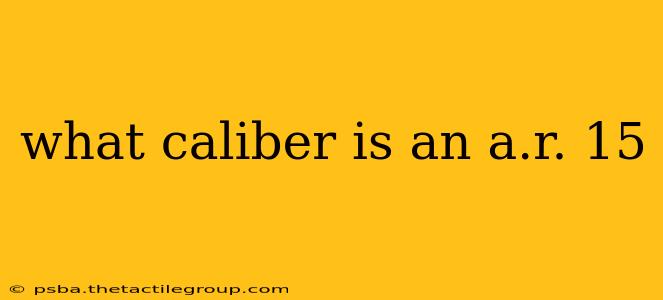What Caliber is an AR-15? Understanding AR-15 Ammunition
The AR-15 is a popular semi-automatic rifle, but its caliber isn't inherently defined by the platform itself. The term "AR-15" refers to a design and pattern of rifles, not a specific cartridge. This means numerous calibers can be chambered in AR-15-style rifles. The most common, however, is .223 Remington/5.56x45mm NATO.
Let's break this down:
.223 Remington vs. 5.56x45mm NATO: What's the Difference?
While often used interchangeably, there are key distinctions between these two cartridges:
-
.223 Remington: This is a commercially produced cartridge with slightly lower pressure specifications.
-
5.56x45mm NATO: This is the military standard cartridge, designed to withstand higher pressures.
The crucial takeaway? While both are commonly used in AR-15s, firing .223 Remington ammunition in a 5.56x45mm NATO chamber is generally safe, the opposite is not true. Firing 5.56x45mm NATO in a .223 Remington chamber can lead to catastrophic damage to the firearm due to the higher pressure. Always check your firearm's owner's manual to confirm the recommended ammunition.
Other Calibers for AR-15 Platforms:
While .223 Remington/5.56x45mm NATO is the most prevalent, the modularity of the AR-15 platform allows for a range of caliber conversions, including:
- 9mm: A popular pistol caliber often used for personal defense.
- .300 Blackout: A supersonic and subsonic capable cartridge designed for short-barreled AR-15s.
- 6.8 SPC: A larger-caliber option offering increased range and stopping power compared to .223/5.56.
- .458 SOCOM: A large, powerful cartridge suitable for hunting or tactical purposes.
The availability of these caliber conversions underscores the AR-15's adaptability and explains why the caliber question requires a more nuanced answer than a single cartridge designation.
Choosing the Right Caliber:
The optimal caliber for an AR-15 depends heavily on the intended use.
-
.223 Remington/5.56x45mm NATO: Ideal for target shooting, hunting small to medium-sized game, and general recreational use. The abundance and affordability of ammunition are significant advantages.
-
Other Calibers: Each offers specific advantages (increased power, shorter-range capabilities, etc.) but often comes with a trade-off in terms of cost, availability, and recoil.
Before purchasing an AR-15 or any ammunition, it's crucial to research thoroughly and understand the implications of each caliber choice to ensure responsible and safe handling. Always consult with experienced firearm owners or professionals to gain a better understanding of different calibers and their applications. This ensures you make informed decisions based on your specific needs and intended use.

